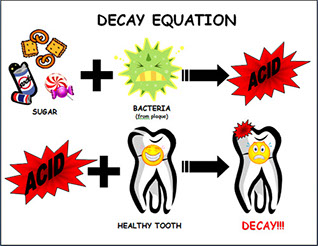Early Childhood Caries
A Healthy Start is Smart!
Introduction
Your child’s baby teeth are important. Children need strong, healthy teeth to chew their food, speak and have a good-looking smile. Baby teeth also keep a space in the jaw for the adult teeth. If a baby tooth is lost too early, the teeth beside it may drift into the empty space. When it’s time for the adult teeth to come in, there may not be enough room. This can make the teeth crooked or crowded. Starting infants off with good oral care can help protect their teeth for decades to come.
What is Early Childhood Caries?
Early Childhood Caries is tooth decay that occurs in the primary (baby) teeth of young children. It occurs when the child’s teeth are frequently exposed to sugary liquids for long periods of time. Such liquids include fruit juice, soda and other sweetened liquids, milk, breast milk and formula.
Tooth decay can begin as soon as a baby’s teeth come in, usually by age six months or so. Decay in baby teeth can cause pain. Left untreated, it can destroy the teeth of an infant or young child. Tooth decay can also have an effect on a child’s general health. He or she may have difficulty eating resulting in poor nutrition.
Symptoms
Your child’s baby teeth are at risk for decay as soon as they first appear, most often around age six months. Tooth decay in infants and toddlers is often referred to as Baby Bottle Tooth Decay or Early Childhood Caries (cavities). It most often occurs in the upper front teeth, but other teeth may also be affected. In some unfortunate cases, infants and toddlers have experienced decay so severe that the teeth cannot be repaired and need to be removed. The good news is that decay is preventable.
Mild Dental Decay, Moderate Dental Decay and Severe Dental Decay
Tooth decay is a disease that begins with cavity-causing bacteria being passed from the mother (or primary caregiver) who has these bacteria in their mouth to the infant. These bacteria are passed through the saliva. When the mother puts the baby’s feeding spoon in her mouth, or cleans a pacifier in her mouth, the bacteria are passed to the baby.
Another factor for tooth decay is the frequent, prolonged exposure of the baby’s teeth to liquids that contain sugar, like sweetened water and fruit juice and potentially milk, breast milk and formula. Tooth decay can occur when the baby is put to bed with a bottle, or when a bottle is used as a pacifier for a fussy baby. The sugary liquids pool around the teeth while the child sleeps. Bacteria in the mouth use these sugars as food. They then produce acids that attack the teeth. Each time your child drinks these liquids, acids attack for 20 minutes or longer. After multiple attacks, the teeth can decay.
Pacifiers dipped in sugar or honey can also lead to tooth decay since the sugar or honey can provide food for the bacteria’s acid attacks.
Infants and toddlers who do not receive an adequate amount of fluoride may also have an increased risk for tooth decay since fluoride combines with the outer covering of the tooth (enamel) and makes the tooth more resistant to the acid attack.
Prevention
The good news is that tooth decay is almost completely preventable. You can help prevent tooth decay for your child by following the tips below:
• Lower the risk of the baby’s infection with decay-causing bacteria. This can be done two ways – by improving the oral health of the mother/caregiver which reduces the number of bacteria in her mouth and by not sharing saliva with the baby through common use of feeding spoons or licking pacifiers and giving them to babies.
• After each feeding, wipe the baby’s gums with a clean, damp gauze pad or washcloth. This will remove plaque and bits of food that can harm erupting teeth. When your child’s teeth begin to erupt, brush them gently with a child’s size toothbrush and water. (Consult with your child’s dentist or physician if you are considering using fluoride toothpaste before age two.)
• When your child can be counted on to spit and not swallow toothpaste (usually not before age two), begin brushing the teeth with a pea-sized amount of toothpaste. The American Dental Association recommends fluoride toothpaste; ask your dentist about your child’s fluoride needs.
• Parents should assist with brushing their child’s teeth until he or she is at least six years old.
• Place only formula, milk or breast milk in bottles. Avoid filling the bottle with liquids such as sugar water, juice or soft drinks.
• Infants should finish their bedtime and naptime bottles before going to bed.
• If your child uses a pacifier, provide one that is clean — don’t dip it in sugar or honey, or put it in your mouth before giving it to the child.
• Encourage children to drink from a cup by their first birthday and discourage frequent or prolonged use of a training (sippy) cup.
• Encourage healthy eating habits that include a diet with plenty of vegetables, fruit and whole grains. Serve nutritious snacks and limit sweets to mealtimes.
• Ensure that your child has adequate exposure to fluoride. Discuss your child’s fluoride needs with your dentist or pediatrician.
Treatment
When your child’s first tooth appears, talk to your dentist about scheduling the first dental visit. Treat the first dental visit as you would a well-baby checkup with the child’s physician. It’s beneficial for the first dental visit to occur within six months after the first tooth appears, but no later than your child’s first birthday. Although this may seem early, starting early is the key to a lifetime of good dental health.




















